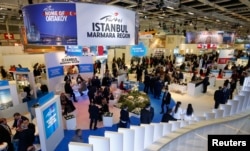Security fears are on everybody's lips at the ITB travel trade fair in Berlin this year as a battered tourist industry seeks to reassure travelers and tour operators that they need not shy away from booking summer holidays for this year.
Attacks in tourist hotspots like a Tunisian beach resort and the city of Paris over the past year have rattled travelers' confidence, sending bookings for Tunisia, Turkey and Egypt plummeting and heralding a slowdown in demand for international travel.
"People have money to spend, but there's a strong negative impact from the geopolitical situation. People fear attacks," Roy Scheerder, commercial director at low cost Dutch airline Transavia, told Reuters at ITB.
Airlines, tour operators, hoteliers and travel search companies at the fair said they had seen more caution than usual in bookings at the start of the year, often a popular time for people to book trips.
A survey by consultancy IPK International projected that growth in the number of international trips taken would slow to 3 percent this year, down from 4.6 percent in 2015.
Rolf Freitag, founder of IPK, said security fears had knocked off about 1.5 percentage points from the expected growth this year. Of 50,000 people in 42 countries surveyed at the start of February, 15 percent said they would either not travel or holiday in their home country this year.
Hotel groups like Marriott International and Best Western expressed concern over tourist bookings for Paris after November's attacks on the French capital, which may have a knock-on effect on other destinations.
"It has a ripple effect. If you think about someone travelling from the United States to Paris, Paris was not the only city they would visit, they would also go to other parts of France or Europe, and that has been curtailed," Best Western CEO David Kong told Reuters.
The beneficiaries are destinations perceived to carry a smaller risk of becoming the target of attacks.
"The really hot markets are anywhere that's safe. Spain is on fire for this summer. Italy is very strong," Darren Huston, chief executive of Priceline Group and its subsidiary Booking.com, told Reuters.
Spanish low-cost carrier Vueling, for instance, has added more capacity to Spanish destinations from Germany, the Netherlands and Switzerland to keep up with demand, though it highlighted that hotel space was running out.
Destinations in North America and the Caribbean are seeing increased demand, while search firm Kayak said Germans were more interested in hotels in their own country this year.
Some in the industry are clinging to hope that tourists will still travel this summer but are holding off on firm bookings longer than usual due to the uncertain security outlook.
"Past experience has shown us that a country that is serious about tourism and has built an infrastructure always bounces back," Taleb Rifai, the head of the United Nations World Tourism Organization (UNWTO), told Reuters in an interview.
"Look at Egypt. It has been up and down for the last 10 years. Every time it comes back stronger than before," he said.






